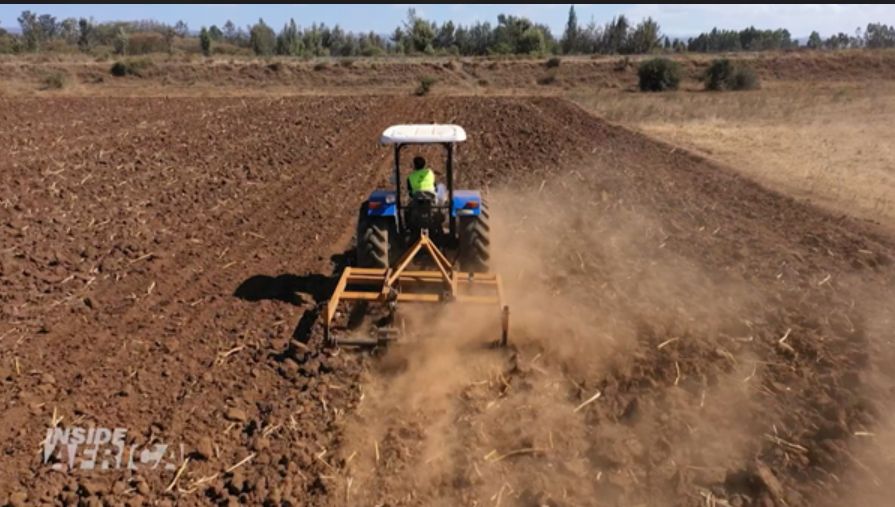In the latest episode of Inside Africa, CNN International explores the future of agriculture and how agricultural technology – agritech – is supporting the industry.
Wandile Sihlobo, Chief Economist at the Agricultural Business Chamber of South Africa establishes the importance of the agritech sector and the continent’s role in it, “We have the potential. Now we need to get to the stage where to say, ‘Let’s realise the potential.’ And I mean, if you think about it in a global space, there is generally an increasing interest in agricultural technology and also in the food sector at large, which means that capital could be available to unlock that potential.”
With limited income and access to credit, machinery tends to be too expensive for small-scale farmers to buy. Folu Okunade is the co-founder and COO of Hello Tractor, a way for farmers in Kenya to rent existing equipment and use it more efficiently. He explains, “We have IOT [Internet of Things] enabled web and mobile platforms that connect farmers with mechanisation service providers or tractor owners. The tractor comes to them, does the work. They now don’t have to own a tractor outright because it doesn’t make sense for them to, if they just own a small piece of land, they’re never going to be able to pay back that tractor.”
Farmer and tractor owner Nashon Ngetich speaks about why the service is useful for owners as well as renters, “I’m able to rent it out to my neighbouring farmers, move around with it around the country and I can make some small amount of money from it as well as pay for it, pay the operator. The opportunity with it is we can plan ourselves easily. When the season kicks in I can plan for it.”
Looking to the future, Okunade hopes to expand beyond just tractors. He tells CNN, “Mechanisation is beyond just ploughing or land preparation, it goes to things like planting, or spreading fertiliser, or spraying, or planting, or harvesting. So, we really see this progression now that we have the customer, how do we move them to a highly engaged customer who’s doing three and more services with us per season.”
Africa is the fastest growing continent and the UN estimates that the population of Sub-Saharan Africa will nearly double by 2050. Improving crop yields is key for feeding this future. Okunade says, “There’s a ton of potential. I don’t think anybody knows the ceiling when it comes to working with smallholder farmers and really solving this food security challenge. So, it’s the challenge that drives me, but it’s also knowing that there’s a huge potential out there.”
Also in Kenya, Inside Africa sees how a mobile app for cow management is transforming milk production. Around 3.8 billion litres of milk are produced in Kenya every year, mostly by small farms. Peninah Wanja, Founder of DigiCow Africa describes where dairy farmers lose money, “One of the key challenges that faces the small holder dairy farmers is low milk production, where farmers get an average of 10 litres per cow per day. Against the potential of 30 litres per cow per day, the same cow. And this challenge is brought in by farmers not keeping records.”
As well as keeping records on milk production, DigiCow can store information on vaccinations, deworming, and artificial insemination. The app sends automatic alerts when a cow is due treatment and can dispatch a vet as necessary. Dairy farmer Murimi Wamabi talks about how the app has helped, “My core business being breeding, they’ve really assisted me in breeding in the sense of keeping my records. And since I’m a busy guy, honestly, when you have somebody who can update, he tells you today, check on heat on this particular animal, this one is due on this date so you should dry it. So, all that information is actually at the tip of my finger.”
DigiCow has already expanded to cover more than just cattle. Wanja says, “We started with a dairy farmer in mind. But out of demand from the farmers we have been able to expand to other value chains. And we are now working with sheep, goat, beef in crops, in potatoes, and also rice. In total, we are working with over 300,000 farmers.”
In Côte d’Ivoire, drones are being used to aid agriculture and increase productivity. They allow farmers to remotely monitor crops and use sophisticated sensors to assess soil quality and detect crop disease. Co-founder of drone maker JooL International Joseph-Olivier Biley describes the company, “JooL was born out of a personal problem my family was having. We have this plantation three to four hours away and my father who is very busy didn’t have time to go there regularly. JooL was born to allow people like my father, agricultural investors, to be able to protect and grow their investments remotely while carrying out their day jobs.”
Drone usage is increasing in Africa, particularly in the medical space, but many are imported from China for affordability and ease. Biley says JooL intends to keep making its own hardware locally, “We are only able to produce small quantities. We need to be able to find the means to expand our production line, by setting up a factory to be able to produce in larger quantities locally, to save costs, to create jobs and to be able to satisfy the whole continent.”
Biley and his team have also set up an academy to train drone pilots. Lanciné Doumouya, Co-founder & VP at JooL Academy speaks about the project, “The academy allows us to train professionals in the agricultural field. To give them an added value in their field of agronomy, in their daily agronomic activity. And also people who have nothing to do with agriculture, who want to improve or learn the drone business and be able to create a source of income. So it’s really aimed at everybody.”
Finally, the show visits Uganda where technology is aiding an urban development project.


